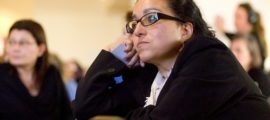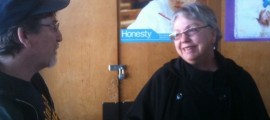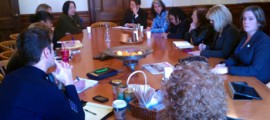Articles Posted in the Politics Category
-
Olague Explains her Support for RCV Repeal Measure
Olague has long ties to the progressive community and was appointed by Mayor Ed Lee to the District 5 seat, one of the city’s most progressive, in January after Ross Mirkarimi was elected Sheriff. This week, she joined Sean Elsbernd, Carmen Chu, Scott Wiener, and Malia Cohen – all considered moderate/conservative supervisors – in supporting Sup. Mark Farrell’s proposal to replace RCV with runoff elections for the mayor’s race and other citywide offices.
-
Gender Inequality Looms Large
on International Women’s DaySteinunn Guðjónsdóttir was the event’s keynote speaker. Ms. Guðjónsdóttir is Project Manager of Shelter for Trafficked Women and Women Exiting Prostitution, in Iceland. She is in the US as part of an international visitor leadership program organized by the State Department, and researching domestic- and gender-based violence. She stated, “Violence against women is a symptom of gender inequality. We must address this.”
-
The Privacy Implications of Facial Recognition Technology
According to How Facial Recognition Systems Work by by Kevin Bonsor and Ryan Johnson, facial recognition technology – in a nutshell – is based on the ability to recognize a face and then measure the various features of the face. Every face has numerous, distinguishable facial features, such as the distance between the eyes; width of the nose; depth of the eye sockets; the shape of the cheekbones; and the length of the jaw line. These features create a numerical code, called a two-dimensional faceprint, representing the face in the database. A newly-emerging trend in facial recognition technology uses a three-dimensional model.
-
Occupy the Capitol: Labor, Students
Unite to Rebalance Education Funding DeficitDozens of people were arrested during Monday’s protest, the culmination of a multi-day march to draw attention to the soaring cost of attending California’s public colleges and universities.
-
Richmond Mayor Welcomes Occupy, Education Marchers
Richmond Mayor Gayle McLaughlin made a morning visit to St. Mark’s Church, the first overnight stop in the four-day Occupy Education march from the Bay Area to Sacramento. The group plans to reach UC Davis Sunday and board busses to join large demonstrations at the capitol Monday. About 100 people signed up for the march, with some joining at stops along the way, according to march organizers.
-
Mayor Quan Confronts Issues
Raised by Arrests of JournalistsThe meeting, held Tuesday afternoon at Oakland City Hall, was called in an effort to discuss incidents of working reporters and photographers being detained and in some cases arrested by Oakland Police Department officers during several Occupy Oakland protests in recent months.
-
Losing Constitutional Competition
The new study examined the provisions of 729 constitutions adopted by 188 countries from 1946 to 2006, and they considered 237 variables regarding various rights and ways to enforce them. This is what they found: “Among the world’s democracies constitutional similarity to the United States has clearly gone into free fall. Over the 1960s and 1970s, democratic constitutions as a whole became more similar to the U.S. Constitution, only to reverse course in the 1980s and 1990s. … the constitutions of the world’s democracies are, on average, less similar to the U.S. Constitution now than they were at the end of World War II.”







 The Hunger Site
The Hunger Site
Recent Comments